See also my ACM profile page, my ORCiD record and Google Scholar.
Interests
My latest research interest is on cloud computing, rethinking the role of an Operating System (OS) now that you can rely on a hypervisor to do many of the things an OS kernel had to do before. I've been working on the MirageOS project to create a "programming framework" (really a set of nicely composable libraries) which makes it easy to write applications which run directly on top of hypervisors. For an overview of this work, check out the recent Communications of the ACM article or the ASPLOS 2013 paper or explore the MirageOS docs.
In the past I've had a lot of fun exploiting the capabilities of smartphones, in particular using
- built-in cameras to track visual tags in real-time: see SpotCode Interfaces;
- built-in microphones and speakers to transmit data, both audibly (e.g. as ringtones) and inaudibly (e.g. as location beacons): see Audio Networking ("the forgotten wireless technology"); and
- (of-course) built-in local networking capabilities (originally Bluetooth but now WiFi) to play games and to join up physical interfaces (e.g. posters, signs, maps) with their virtual equivalents: see Interacting with Mobile Services: An Evaluation of Camera-Phones and Visual Tags.
Earlier still, my PhD research focused on application-level security policies for mobile web-based systems. The work was supervised by Alan Mycroft in the CL. I'm grateful to Andy Hopper from the LCE (now the DTG) and the Schiff Foundation for support and funding respectively. I was also sponsored by the now defunct AT&T Laboratories Cambridge Ltd.
Papers which won prizes
Several of the papers we've written have won prizes:
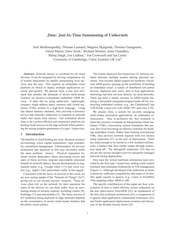 |
Jitsu: Just-In-Time Summoning of Unikernels - A. Madhavapeddy, T. Leonard, M. Skjegstad, T. Gazagnaire, D. Sheets, D.Scott, R. Mortier, A. Chaudhry, B. Singh, J. Ludlam, J. Crowcroft, I. Leslie won the Cambridge Computer Lab Ring Publication of the Year 2016 and was presented at 12th USENIX symposium on Networked Systems Design and Implementation (NSDI 2015) We presented Jitsu: a system optimised for spinning up tiny Unikernels in response to network traffic. For example when the first TCP/IP SYN packet arrives for a webserver, we would buffer the packet while simultaneously starting the Unikernel which completes the handshake when it finishes booting in a few hundred milliseconds on an ARM A20. |
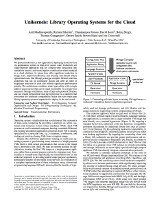 |
Unikernels: Library Operating Systems for the Cloud - A. Madhavapeddy, R. Mortier, C. Rotsos, D. Scott, B. Singh, T. Gazagnaire, S. Smith, S. Hand, J Crowcroft Won one of the Influential Paper Awards at ASPLOS 2025 and earlier a HIPEAC 2013 award. Initially presented at Eighteenth International Conference on Architectural Support for Programming Languages and Operating Systems (ASPLOS 2013)We present unikernels, a new approach to deploying cloud services via applications written in high-level source code. Unikernels are single-purpose appliances that are compile-time specialised into standalone kernels, and sealed against modification when deployed to a cloud platform. In return they offer significant reduction in image sizes, improved efficiency and security, and should reduce operational costs. Our Mirage prototype compiles OCaml code into unikernels that run on commodity clouds and offer an order of magnitude reduction in code size without significant performance penalty. The architecture combines static type-safety with a single address-space layout that can be made immutable via a hypervisor extension. Mirage contributes a suite of type-safe protocol libraries, and our results demonstrate that the hypervisor is a platform that overcomes the hardware compatibility issues that have made past library operating systems impractical to deploy in the real-world. This describes the awesomeness of the MirageOS open-source library OS |
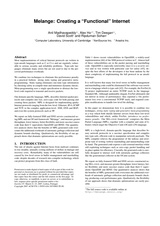 |
Melange: creating a functional internet - A. Madhavapeddy, A. Ho, T. Deegan, D. Scott, R. Sohan Best student paper at EuroSys 2007 We present a framework based in OCaml called ``Melange'' which uses strong static typing and generative meta-programming to eliminate a serious class of bugs from Internet servers without paying a performance penalty. We report on fully-featured SSH and DNS servers and measure greater throughput, lower latency and increased flexibility all with source code which is more succinct than the C equivalents: OpenSSH and BIND. Quite a fun piece of work which shows how well you can do by throwing away the old designs and starting again, with benefit of hindsight. Seems to evoke a love/hate response in readers. |
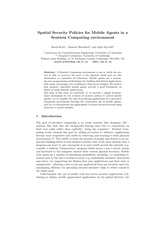 |
Spatial Security Policies for Mobile Agents in a Sentient Computing Environment - D. Scott, A. Beresford, A. Mycroft Won the European Association of Software Science and Technology (EASST) Best Software Science Paper award at FASE 2003 (part of ETAPS 2003) in Warsaw, Poland. A Sentient Computing environment is one in which the system is able to perceive the state of the physical world and use this information to customise its behaviour. Mobile agents are a promising new programming methodology for building distributed applications. We presented: (i) a simple location-based mechanism for the creation of security policies to control mobile agents; (ii) a method of writing applications for a pervasive computing environment through the use of mobile agents and (iii) a demonstration of the applicability of recent theoretical work using ambients to model mobility. A fun project which combined ceiling-mounted ultrasonic location sensors and a very small amount of theory |
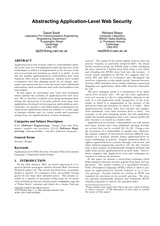 |
Abstracting Application-Level Web Security - D. Scott, R. Sharp Best Paper at the 11th International World-Wide Web conference (WWW2002) Application-level web security refers to vulnerabilities inherent in the code of a web-application (irrespective of the technologies in which it is implemented or the security of the systems on which it is build). Many application-level vulnerabilities have been exploited with serious consequences: hackers have tricked e-commerce sites into shipping goods for no charge, accounts have been hijacked and confidential information leaked. We present new tools and techniques which allow the abstraction of security policy from large web-applications in heterogeneous multi-platform environments and analyse their usefulness. I think people liked this paper because of its practical focus and good timing. It's worth reading if only for the jokes! |
Refereed Reports
| 2026 |
A. Madhavapeddy, D. J. Scott, J. Cormack A Decade of Docker Containers |
Communications of the ACM, March 2026. DOI: 10.1145/3761803 |
| 2025 |
A. Madhavapeddy, D. J. Scott, P. Ferris, Ryan T. Gibb, T. Gazagnaire Functional Networking for Millions of Docker Desktops (Experience Report) |
Proceedings of the ACM on Programming Languages, Volume 9, Issue ICFP, Article No.: 256, Pages 597 - 615. DOI: 10.1145/3747525 |
| 2015 |
A. Madhavapeddy, T. Leonard, M. Skjegstad, T. Gazagnaire, D. Sheets, D.Scott, R. Mortier, A. Chaudhry, B. Singh, J. Ludlam, J. Crowcroft, I. Leslie Jitsu: Just-In-Time Summoning of Unikernels |
Presented at 12th USENIX symposium on Networked Systems Design and Implementation (NSDI 2015), May 2015 |
| 2014 |
A. Madhavapeddy, D. Scott Unikernels: The Rise of the Virtual Library Operating System |
Appeared in Communications of the ACM, January 2014 |
| 2013 |
A. Madhavapeddy, R. Mortier, C. Rotsos, D. Scott, B. Singh, T. Gazagnaire, S. Smith, S. Hand, J. Crowcroft Unikernels: Library Operating Systems for the Cloud |
Appeared in Eighteenth International Conference on Architectural Support for Programming Languages and Operating Systems (ASPLOS 2013), March 2013 |
| 2010 |
D. Scott, R. Sharp, T. Gazagnaire, A. Madhavapeddy Using Functional Programming within an Industrial Product Group: Perspectives and Perceptions |
Appeared in The 15th ACM SIGPLAN International Conference on Functional Programming (ICFP '10), September 2010 |
| 2007 |
A. Madhavapeddy, A. Ho, T. Deegan, D. Scott, R. Sohan Melange: Towards a "functional" Internet |
Appeared in EuroSys 2007, March 2007 |
| 2006 |
E. Toye, R. Sharp, A. Madhavapeddy, D. Scott, E. Upton, A. Blackwell Interacting with Mobile Services: An Evaluation of Camera-Phones and Visual Tags |
In Personal and Ubiquitous Computing Journal, February 2006 |
| 2005 |
A. Madhavapeddy, R. Sharp, D. Scott, A. Tse Audio Networking: The Forgotten Wireless Technology |
In IEEE Pervasive Computing (volume 4, number 3), July-September 2005 |
| 2005 |
A. Madhavapeddy, D. Scott, R. Sharp SPLAT: A Tool for Model-Checking and Dynamically Enforcing Abstractions |
In the proceedings of the 12th Internation SPIN Workshop on Model Checking of Software (SPIN 2005) |
| 2005 |
E. Toye, R. Sharp, A. Madhavapeddy, D.Scott Using Smart Phones to Access Site-Specific Mobile Services |
In the special issue of IEEE Pervasive Computing on the Smart Phone: A First Platform for Pervasive Computing, April-June 2005 |
| 2005 |
A. Madhavapeddy, D. Scott On the Challenge of Delivering High-Performance, Dependable, Model-Checked Internet Servers |
In the proceedings of the First Workshop on Hot Topics in System Dependability (HotDep-05), June 2005. |
| 2005 |
D. Scott, R. Sharp, A. Madhavapeddy, E. Upton Using Visual Tags to Bypass Bluetooth Device Discovery |
|
| 2004 |
D. Scott Abstracting Application-Level Security Policy for Ubiquitous Computing |
PhD thesis, University of Cambridge |
| 2004 |
K. Mansley, A. Beresford, D. Scott The Carrot Approach: Encouraging use of location systems |
This paper describes techniques to encourage (rather than force) the use of location-aware apps in the face of declining participation. Presented at The Sixth International Conference on Ubiquitous Computing (UBICOMP 2004) in Nottingham, UK in Septempter 2004 |
| 2004 |
K. Mansley, D. Scott, A. Tse, A. Madhavapeddy Feedback, Latency, Accuracy: Exploring Tradeoffs in Location-Aware Gaming |
Presented at NetGames 2004, in conjunction with ACM SIGCOMM 2004, August 2004 |
| 2003 |
A. Madhavapeddy, D. Scott, R. Sharp Context-Aware Computing with Sound |
This paper describes simple techniques for audible data communication and shows how these channels, although low bandwidth, may be used to create cheap context-aware applications. Presented at The Fifth International Conference on Ubiquitous Computing (UBICOMP) 2003 in Seattle, Washington. |
| 2003 |
D. Scott, R. Sharp Specifying and Enforcing Application-Level Web Security Policies |
Invited contribution to Jul/Aug 2003 IEEE Transactions in Knowledge and Data Engineering (TKDE) |
| 2003 |
A. Madhavapeddy, A. Mycroft, D. Scott, R. Sharp The Case For Abstracting Security Policies |
This paper describes an infrastructure for imposing Stateful Syscall Policies on existing programs. Presented at The 2003 International Conference on Security and Management |
| 2003 |
D. Scott, A. Beresford, A. Mycroft Spatial Policies for Sentient Mobile Applications |
This paper describes a runtime for implementing a Spatial Policy system for sentient applications built from Mobile Agents Presented at IEEE Policy 2003. |
| 2003 |
D. Scott, A. Beresford, A. Mycroft Spatial Security Policies for Mobile Agents in a Sentient Computing environment |
Presented at FASE 2003 (part of ETAPS 2003) in Warsaw, Poland. Won the European Association of Software Science and Technology (EASST) Best Software Science Paper award.
|
| 2002 |
D. Scott, R. Sharp Developing Secure Web Applications (C)2002 IEEE Internet Computing |
IEEE Internet Computing Magazine in the Nov/Dec 2002 special issue on The Technology of Trust |
| 2002 |
D. Scott, R. Sharp Abstracting Application-Level Web Security Please read the errata |
Proceedings of the 11th International World-Wide Web conference (WWW2002) where it also received the "Best Paper" award. |
| 2001 |
J. Weatherall, D. Scott Mobile Computing with Python |
Proceedings of the 9th International Python Conference Python9), March 2001 |
Unrefereed Reports
2005 |
D. Scott Abstracting application-level security policy for ubiquitous computing |
Technical Report UCAM-CL-TR-613, University of Cambridge |
2004 |
E. Toye, A. Madhavapeddy, R. Sharp, D. Scott, A. Blackwell, E. Upton Using camera-phones to interact with context-aware mobile services |
Technical report UCAM-CL-TR-609, University of Cambridge |
| 2002 |
D. Scott, R. Sharp SPECTRE: A Tool for Inferring, Specifying and Enforcing Web-Security Policies |
This paper describes the implementation of the dynamic policy enforcement tool called "SPECTRE" |
| 2002 |
D. Scott, R. Sharp The SWAP Project |
This poster describes the overall aim of the SWAP Project |
Videos
| 2003 |
A. Madhavapeddy, D. Scott, R. Sharp Audio Notes |
This video demonstrates how audionotes (special sequences of DTMF tones) may be used to store and retrieve documents via standard audio recording equipment. |
| 2003 |
A. Madhavapeddy, D. Scott, R. Sharp Audio Authentication |
This video demonstrates how a capability to access a resource may be sent as a melodic ring tone via SMS to a mobile phone handset. |
| 2003 |
A. Madhavapeddy, D. Scott, R. Sharp Room-grained Location |
This video demonstrates how audio beacons operating at approximately 21kHz (imperceptible to humans) may be used to easily infer room-grained location. |
| 2003 |
A. Madhavapeddy, D. Scott, R. Sharp Telephone Attachments |
This video demonstrates how document references may be easily transmitted across telephone networks as sequences of DTMF tones. |